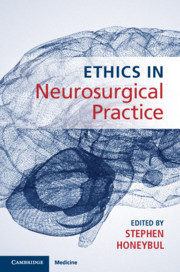Book contents
- Ethics in Neurosurgical Practice
- Ethics in Neurosurgical Practice
- Copyright page
- Contents
- Contributors
- Introduction
- Part I General Ethics
- Part II Neurosurgery-Specific Bioethics
- Chapter 10 A Historical Overview of Ethics in Neurosurgery
- Chapter 11 Evidence-Based Neurosurgery: Principles, Applicability, and Challenges
- Chapter 12 Ethical Challenges of Neurosurgical Care for Brain Tumour Patients
- Chapter 13 Severe Traumatic Brain Injury
- Chapter 14 ‘Malignant’ Middle Cerebral Artery Infarction
- Chapter 15 Aneurysmal Subarachnoid Haemorrhage
- Chapter 16 Paediatric Neurosurgery
- Chapter 17 Spinal Neurosurgery
- Chapter 18 Ethical Challenges in Psychosurgery: A New Start or More of the Same?
- Chapter 19 Brain Death and Organ Donation
- Part III Future Developments
- Index
- References
Chapter 11 - Evidence-Based Neurosurgery: Principles, Applicability, and Challenges
from Part II - Neurosurgery-Specific Bioethics
Published online by Cambridge University Press: 29 May 2020
- Ethics in Neurosurgical Practice
- Ethics in Neurosurgical Practice
- Copyright page
- Contents
- Contributors
- Introduction
- Part I General Ethics
- Part II Neurosurgery-Specific Bioethics
- Chapter 10 A Historical Overview of Ethics in Neurosurgery
- Chapter 11 Evidence-Based Neurosurgery: Principles, Applicability, and Challenges
- Chapter 12 Ethical Challenges of Neurosurgical Care for Brain Tumour Patients
- Chapter 13 Severe Traumatic Brain Injury
- Chapter 14 ‘Malignant’ Middle Cerebral Artery Infarction
- Chapter 15 Aneurysmal Subarachnoid Haemorrhage
- Chapter 16 Paediatric Neurosurgery
- Chapter 17 Spinal Neurosurgery
- Chapter 18 Ethical Challenges in Psychosurgery: A New Start or More of the Same?
- Chapter 19 Brain Death and Organ Donation
- Part III Future Developments
- Index
- References
Summary
Evidence-based neurosurgery (EBN) is a paradigm of practicing neurosurgery which integrates the current best research evidence; surgical expertise, experience, and judgement; patient values, expectations, and preferences; and clinical circumstances to provide a framework for optimal patient care. Sources of evidence range from expert opinions via randomized control trials to systematic reviews and meta-analyses. The evidence is usually categorized and ranked into ‘level or class of evidence’, evaluated for quality and graded into ‘strength of recommendation’.The process of EBN involves several steps that include using experience to identify knowledge gaps and information needs, formulating answerable questions, identifying potentially relevant research, assessing the validity of evidence and results, developing clinical policies that align research evidence and clinical circumstances, and applying research evidence to individual patients with their specific expectations and values. Evidence-based neurosurgical practice is the use of current best evidence in helping individual patients make decisions about their care in the light of their personal values and beliefs.Evidence-based neurosurgery is a tool of considerable value for neurosurgical practice, albeit not without limitations and challenges. Neurosurgeons should cultivate sound evidence-based practice for effective and safe neurosurgical practice.
- Type
- Chapter
- Information
- Ethics in Neurosurgical Practice , pp. 101 - 111Publisher: Cambridge University PressPrint publication year: 2020

